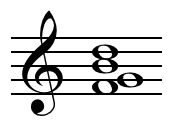Factor (chord)



In music, a factor or chord factor is a member or component of a chord. These are named root, third, fifth, sixth, seventh, ninth (compound 2nd), eleventh (compound 4th), thirteenth (compound 6th), and so on, for their generic interval above the root.[1] In harmony, the consonance and dissonance of a chord factor and a nonchord tone are distinguished, respectively.[2]
Chord factors are taken into consideration in voicing and voice leading. A chord contains exactly as many factors as it contains unique pitch names (octaves don't matter), while a voicing can have any number of voices that draw from and represent some or all the factors of a chord in various octaves. Thus, a chord with three unique pitch names always has three factors, even if some of those pitches are doubled or omitted in a particular voicing. For example, the figure to the right shows a four-note voicing of a C Major triad, which has three chord factors. The "root" chord factor (pitch name "C"), is represented twice in the voicing by voices 1 and 4 in different octaves. The chord factor called the "fifth" (pitch name "G") is represented in voice 2 (shown in red).
The chord factor that is in the bass determines the inversion of the chord. For example, if the third is in the bass it is a first inversion chord (figured bass: 6
3) while if the seventh is in the bass the chord is in third inversion (4
2). The illustration shows one possible four-note voicing of a G7 third-inversion chord (written G7/F in lead-sheet chord-symbol notation), with every chord factor being represented once by a voice in the voicing.
In Tertian harmony, chords are made more complex, or "extended", by introducing additional chord factors stacked in thirds. The illustration shows the theoretical construction of a C13 chord having seven chord factors, with the "extended" chord factors shown in red. In real applications, it is common practice to omit the eleventh from voicings of a dominant 13 chord, because though being necessary to theoretically derive the thirteenth by stacking on it, the unaltered perfect eleventh clashes with the major third.
See also
[edit]References
[edit]- ^ O'Toole, Patricia (2003). Shaping Sound Musicians, p. 368. ISBN 1-57999-211-0.
- ^ Ostransky, Leroy (1977). Understanding Jazz, p. 91. ISBN 0-13-936542-7.

